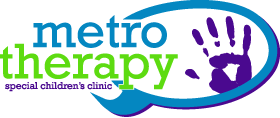Why Your Child’s Occupational Therapy May Look Like Play
Let's dive into why "play" is a significant element of pediatric occupational therapy. At Metro Therapy, we regularly use play in our language therapy with young children and we find this is the best way for children to develop their language skills.
It's Okay to Play!
It's not uncommon for parents and caregivers to express worry that their children are not working or learning enough when their occupational therapy sessions look like play. We're here to tell you—work and play go hand-in-hand! Your child and their occupational therapist are not just playing. In fact, for children, playing is not a distraction from learning whatsoever. Playing is learning. Children learn best with context-rich, multisensory experiences.
What Play Looks Like in Pediatric Occupational Therapy Sessions
Through interactive games like peekaboo and singing songs with accompanying actions, we target skills like imitation, engagement, and initiation. When playing with toys, Metro Therapy occupational therapists are targeting specific communication goals and using strategies to build language skills. Even seemingly simple toys, like a farm set, offer rich opportunities for communication goals, from following directions to imitating animal sounds. Together, with their occupational therapist, children may practice communicating their needs and wants, or combining action words and descriptive words to communicate the scene in front of them.
Continuing to Play and Learn at Home
Another benefit to using toys in therapy is that the skills that we're working on in the session may be carried over at home or at their daycare. As children grow, we blend structured activities with play-based ones to maintain motivation and make therapy meaningful.
Targeting skills through play builds neural connections, promotes positive relationships, and provides meaningful context, making it a cornerstone of our speech sessions. If you have concerns about your child's speech or language, call Metro Therapy at (763) 450-9400.
